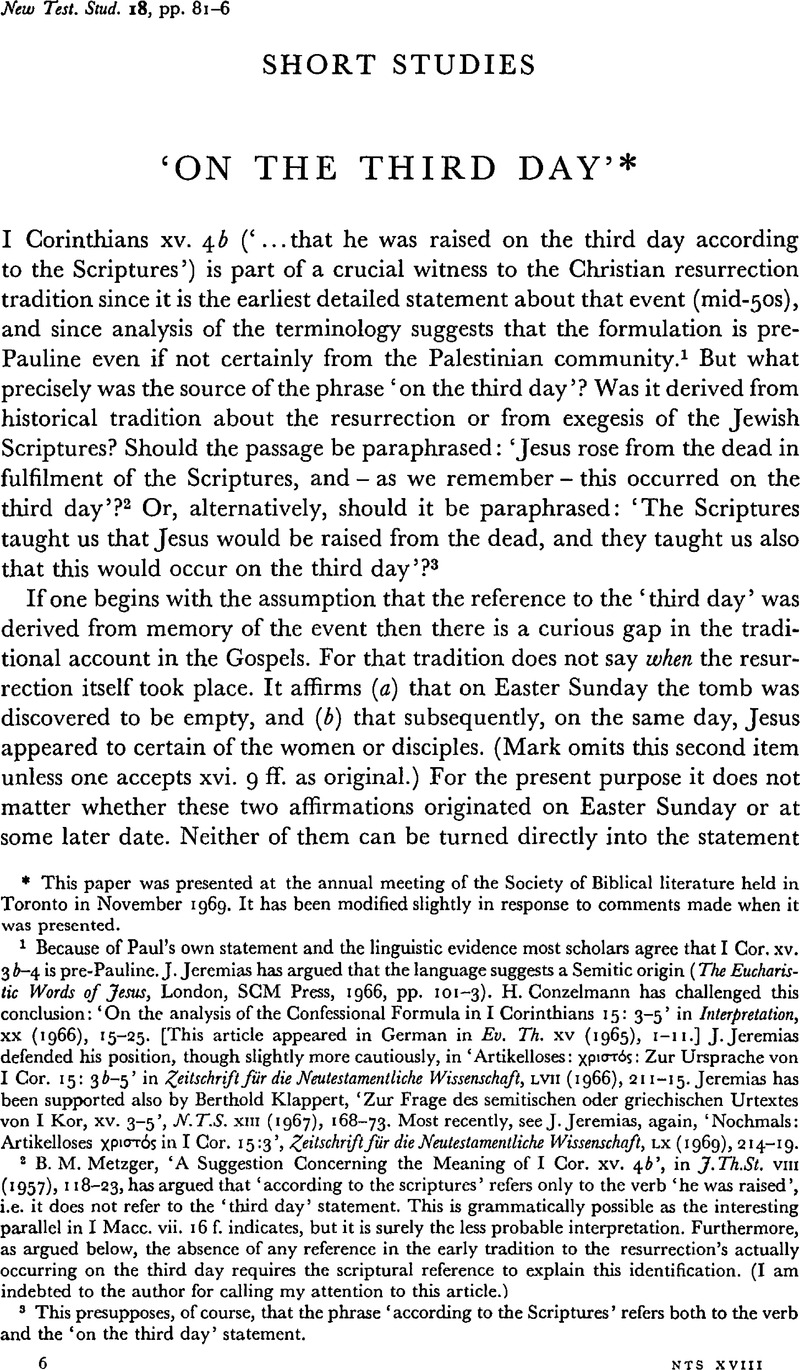Published online by Cambridge University Press: 05 February 2009

page 81 note 1 Because of Paul's own statement and the linguistic evidence most scholars agree that I Cor. xv. 3b-4 is pre-Pauline. Jeremias, J.has argued that the language suggests a Semitic origin (The Eucharistic Words of Jesus, London, SCM Press, 1966, pp. 101–3)Google Scholar. Conzelmann, H. has challenged this conclusion: ‘On the analysis of the Confessional Formula in I Corinthians 15: 3–5’ in Interpretation, xx (1966), 15–25Google Scholar. [This article appeared in German in Ev. Th. xv (1965), 1–11Google Scholar.] J. Jeremia defended his position, though slightly more cautiously, in ‘Artikelloses: χριστός: Zur Ursprache von I Cor. 15: 3b-5’ in Zeitschrift für die Neutestamentliche Wissenschaft, LVII (1966), 211–15Google Scholar. Jeremias has been supported also by Klappert, Berthold, ‘Zur Frage des semitischen oder griechischen Urtextes von I Kor, xv. 3–5,’ N.T.S. XIII (1967), 168–73Google Scholar. Most recently, see Jeremias, J., again, ‘Nochmals: Artikelloses χριότός in I Cor. 15:3,’ Zeitschrift für die Neutestamentliche Wissenschaft, LX (1969), 214–19.Google Scholar
page 81 note 2 Metzger, B. M., ‘A Suggestion Concerning the Meaning of I Cor. xv. 4b,’, in J. Th.St. VIII (1957), 118–23CrossRefGoogle Scholar, has argued that ‘according to the scriptures’ refers only to the verb ‘he was raised’, i.e. it dies not refer to the ‘third day’ statement. This is grammatically Possible as the interesting parallel in I Macc. vii. 16 f. indicates, but it is surely the less Probable interpretation. Furthermore, as argued below, the absence of any reference in the early tradition to the resurrection's actually occurring on the third day requries the scriptural reference to explain this identification. (I am indebted to the author for calling my attention to this article.)
page 81 note 3 This presupposes, of course, that the phrase ‘according to the Scriptures’ refers both to the verb and the ‘on the third day’ statement.
page 82 note 1 McCasland, S. V., ‘The Scripture Basis of “On the Third Day”,’, in J.B.L. XLVIII (1929), 124–37Google Scholar, argued that Matt. xxvii. 52 f. suggested a resurrection on the same day as the crucifixion.
page 82 note 2 For example: Dodd, C. H., According to the Scriptures (London, Nisbet & Co., 1952), pp. 77, 103Google Scholar; Wijngaards, J., ‘Death and Resurrection in Covenantal Context (Hos. vi. 2),’ V. T. XVII (1967), 226–38Google Scholar; Evans, C. F., Resurrection and the New Testament (SBT 2nd series, no. 12) (London, SCM Press, 1970), pp. 47–50Google Scholar; Lindars, B., New Testament Apologetic (Philadelphia, Westminster Press, 1961), pp. 60–6Google Scholar; G. Delling, the articles in T.W.N.T. on ‘day’ and ‘three’; Black, M., ‘The “Son of Man” Passion Sayings in the Gospel Tradition,’ Z.N.W. LX (1969), 1–8Google Scholar. All these suggest Hos. vi. 2 as the Old Testament reference.
page 82 note 3 B. M. Metzger, op. cit.; S. V. McCasland, op. cit. It has been objected also that the only Old Testament Passage used explicity in this context is the Jonah reference in Matt. xii. 40, and this is assumed to be a late element in the Synoptic tradition.
page 82 note 4 J. Wijngaards, op. cit.
page 85 note 1 See the discussion of Field, F., Notes on select Passages of the Greek New Testament (Oxford University Press, 1881), pp. 7–9Google Scholar (on Matt. xvi. 12). The equation of ‘on the third day’ and ‘after three days’ has been challenged by Walker, Norman, ‘After Three Days,’ N.T. IV (1960), 216–2Google Scholar. For the present purpose the crucial point is that Rabbinic references used ‘on the third day’ and ‘after three days’ passages as equivalents. This is amply illustrated by items nos. 5, 7, 11 and 12 quoted in the text.
page 85 note 2 The best recent discussion of the historical questions relating to the resurrection of Jesus is to be found in Grass, Hans, Ostergeschehen und Osterberichte (Göttingen, Vandenhoeck & Ruprecht, 2nd ed. 1962)Google Scholar. His comments on issues relating to the present discussion appear on pp. 127–38. On p. 137 he suggests that the Targum may have omitted the Specific time references in Hos. vi. 2 because of the Christian use of this Passage. This is conceivable but certainly highly speculative.
page 86 note 1 I am gratified, however, to note M. Black's Comment on the Targum in this connection: ‘ …much of it is certainly pre-Christian’ (op. cit. p. 5).